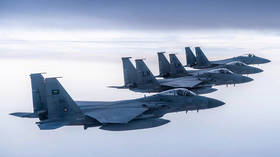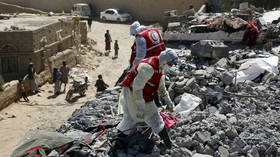US explains ‘moral responsibility’ of weapons producers

General Kenneth McKenzie, head of the US Central Command, has accused Iran of being “morally responsible” for drone and missile strikes by the Houthi militia of Yemen against the UAE and Saudi Arabia.
McKenzie is currently visiting the United Arab Emirates to give Abu Dhabi “assurance” that the US stands with the Gulf country against what he described as a threat from Tehran.
The US ordered a squadron of F-22 fighters and the guided-missile destroyer USS Cole to the Emirates last week, after a series of strikes by drones and missiles launched by the Houthis.
“The equipment they are firing is certainly Iranian,” McKenzie said, referring to the Houthis. “If Iran didn’t approve this specific attack, they’re certainly morally responsible for it.”
Lt. Gen. Hamad Mohammed Thani Al Rumaithi, Chief of Staff, today received General Kenneth F. McKenzie, Commander @CENTCOM. They discussed aspects of cooperation and coordination between the #UAE and the U.S. in the fields of defence and military affairs. pic.twitter.com/BPKIkQa1W5
— وزارة الدفاع |MOD UAE (@modgovae) February 8, 2022
The Houthis have taken responsibility for the strikes, calling them reprisals for the bombing of Yemen conducted by Saudi Arabia and the UAE since March 2015 and saying they will continue until the invaders withdraw.
The US has backed the Saudi-led coalition, echoing its allegation that the Houthis – who are Shia Muslims, just like Iranians – are a “proxy” of Tehran. McKenzie’s choice of words opened him up to criticism of the US role in the Yemen conflict, however.
“Logically then, the US is also morally responsible for the [tens of thousands] killed with US weapons, since the US sells +$60 [billion] of weapons to the UAE and Saudi,” tweeted Trita Parsi of the Quincy Institute for Responsible Statecraft, an anti-interventionist think tank in Washington.
Bombs and missiles supplied by the US have been repeatedly used by the Saudi-led coalition to bomb Yemen. A video filmed after the January 21 attack that killed dozens, including children, showed a munition fragment bearing the manufacturer code for Raytheon, a major US missile-maker. The current US Defense Secretary Lloyd Austin took a seat on Raytheon’s board after retiring from Central Command in 2016.
McKenzie’s theory about the Houthi attacks was that Iran was blaming the UAE for losing influence in Iraq after the recent elections. “Iran thought they had a political way forward to eject the United States from Iraq … now I think they’re grasping at alternatives, and some of those alternatives may be kinetic and violent,” he said, according to the Washington Post.
However, the Post also described blaming Iran as a way of bypassing objections in the US Congress to supporting the Saudi-led war in Yemen, saying there was “greater acceptance” among lawmakers of deploying US troops, ships and airplanes to “monitor and stave off Iranian aggression.”













